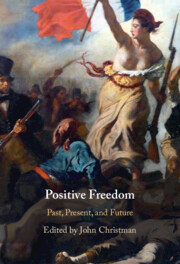59 results
Index
-
- Book:
- Positive Freedom
- Published online:
- 03 September 2021
- Print publication:
- 16 September 2021, pp 274-276
-
- Chapter
- Export citation
Works Cited
-
- Book:
- Positive Freedom
- Published online:
- 03 September 2021
- Print publication:
- 16 September 2021, pp 255-273
-
- Chapter
- Export citation
Introduction - The Multiple Dimensions of Positive Freedom
-
-
- Book:
- Positive Freedom
- Published online:
- 03 September 2021
- Print publication:
- 16 September 2021, pp 1-7
-
- Chapter
- Export citation
Copyright page
-
- Book:
- Positive Freedom
- Published online:
- 03 September 2021
- Print publication:
- 16 September 2021, pp iv-iv
-
- Chapter
- Export citation
Acknowledgments
-
- Book:
- Positive Freedom
- Published online:
- 03 September 2021
- Print publication:
- 16 September 2021, pp ix-x
-
- Chapter
- Export citation
Contents
-
- Book:
- Positive Freedom
- Published online:
- 03 September 2021
- Print publication:
- 16 September 2021, pp v-vi
-
- Chapter
- Export citation
Contributors
-
- Book:
- Positive Freedom
- Published online:
- 03 September 2021
- Print publication:
- 16 September 2021, pp vii-viii
-
- Chapter
- Export citation
Chapter 7 - Basic Freedom in the Real World
-
-
- Book:
- Positive Freedom
- Published online:
- 03 September 2021
- Print publication:
- 16 September 2021, pp 120-140
-
- Chapter
- Export citation

Positive Freedom
- Past, Present, and Future
-
- Published online:
- 03 September 2021
- Print publication:
- 16 September 2021
Autonomy and Personal History1
-
- Journal:
- Canadian Journal of Philosophy / Volume 21 / Issue 1 / March 1991
- Published online by Cambridge University Press:
- 01 January 2020, pp. 1-24
-
- Article
- Export citation
Defending Historical Autonomy: A Reply to Professor Mele
-
- Journal:
- Canadian Journal of Philosophy / Volume 23 / Issue 2 / June 1993
- Published online by Cambridge University Press:
- 01 January 2020, pp. 281-289
-
- Article
- Export citation
3308 Training KL2 Scholars to Communicate Science to a General Audience
-
- Journal:
- Journal of Clinical and Translational Science / Volume 3 / Issue s1 / March 2019
- Published online by Cambridge University Press:
- 26 March 2019, p. 75
-
- Article
-
- You have access
- Open access
- Export citation
4 - Our talents, our histories, ourselves: Nozick on the original position argument
-
-
- Book:
- The Original Position
- Published online:
- 05 December 2015
- Print publication:
- 10 December 2015, pp 77-96
-
- Chapter
- Export citation
6 - Autonomy and liberalism: a troubled marriage?
- from II - Normative foundations
-
-
- Book:
- The Cambridge Companion to Liberalism
- Published online:
- 05 March 2015
- Print publication:
- 19 February 2015, pp 141-162
-
- Chapter
- Export citation
Contributors
-
-
- Book:
- The Cambridge Companion to Liberalism
- Published online:
- 05 March 2015
- Print publication:
- 19 February 2015, pp vii-ix
-
- Chapter
- Export citation
List of contributors
-
-
- Book:
- New Frontiers in the Philosophy of Intellectual Property
- Published online:
- 05 August 2012
- Print publication:
- 05 July 2012, pp vii-viii
-
- Chapter
- Export citation
1 - Autonomy, social selves and intellectual property claims
-
-
- Book:
- New Frontiers in the Philosophy of Intellectual Property
- Published online:
- 05 August 2012
- Print publication:
- 05 July 2012, pp 33-57
-
- Chapter
- Export citation
Individual differences in semantic switching flexibility: Effects of handedness
-
- Journal:
- Journal of the International Neuropsychological Society / Volume 15 / Issue 6 / November 2009
- Published online by Cambridge University Press:
- 01 November 2009, pp. 1023-1027
-
- Article
- Export citation
4 - The narrative self
-
- Book:
- The Politics of Persons
- Published online:
- 15 December 2009
- Print publication:
- 17 September 2009, pp 66-85
-
- Chapter
- Export citation
1 - Introduction
-
- Book:
- The Politics of Persons
- Published online:
- 15 December 2009
- Print publication:
- 17 September 2009, pp 1-18
-
- Chapter
- Export citation



